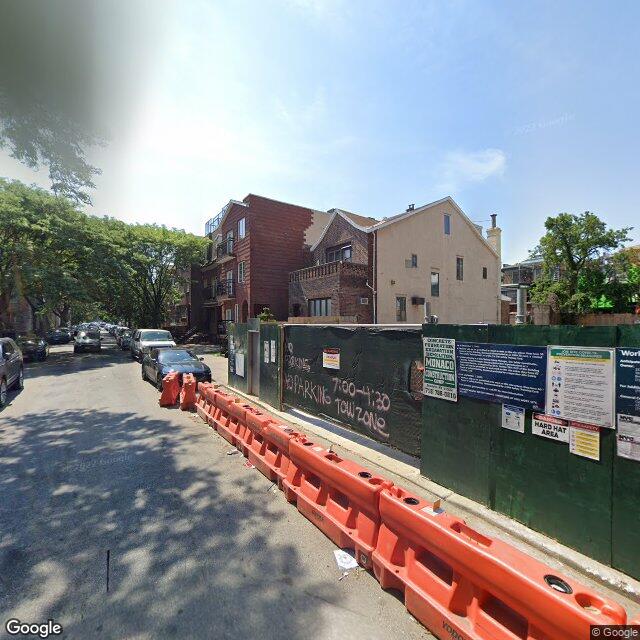What are Lot Line Windows in NYC Real Estate?

Table of Contents
Lot Line Windows–Are They Common in NYC?
Lot line windows. Every New Yorker has seen them before, stretching alone the sides of buildings. But many people do not know exactly what these real estate features are, or what they mean for a home’s value. On this page, we will walk you through everything you need to know about lot line windows: what they are, how to tell if you have them, and why some homeowners want to avoid them.

Lot line windows are just what they sound like: windows that are on the lot line. But what is a lot line? It is the border of the property, or “lot.” So if your apartment has a lot line window, that means it is at the very edge, abutting the lot line of the neighboring property.
While these windows can add valuable access to light and fresh air, they are also at risk of being bricked over when new development is built on the neighboring lot. You can find out if the windows in your apartment are on the lot line by checking the unit’s offering plan before you buy.
Offering Plans–Understanding Your New Apartment
What is an offering plan? It is an important tool in understanding the included features (like lot line windows, for example) of your new home. Before buying real estate, it is important to find and read the offering plan so you can be an informed consumer.
What Is in an Offering Plan?

The offering plan is a document that details the important information you need to know before making a real estate purchase, so it will typically include the following:
The price: this will tell you how much the unit will cost, as well as the down payment required. It will likely not include closing costs and fees, such as real estate transfer taxes, mansion taxes, and mortgage filing fees. Keep these added expenses in mind.
- The floor plan: this is a scale drawing of the space that includes the dimensions, features, and layout of the property. Want to know if your new unit has a lot line window? Check the floor plan. These windows will usually be along the sides of the building, and sometimes in the back, but never the front.
- The building’s rules and regulations: for condo purchases, this will include the basic building rules. If you are looking to buy a co-op unit, then the offering plan should also walk you through the co-op board’s policies, finances, and structure of operations.
- The purchasing process: this includes information on the application process, the buying process, and the closing process. Things like who is responsible for the different closing costs will be outlined here, as well as the timeline buyers can expect to follow.
Offering plans also include general information that may influence your decision to purchase a piece of property. For example, is the building purely residential or mixed use? What are the available amenities? Is the building still undergoing constructions, and what does that mean for you? The offering plan can help fill in these cracks before you buy.
Where Can You Find an Offering Plan?
You can find the answers to many of your questions in these plans, as well as information about things you may have not even considered. To find a specific offering plan in New York City, you can search the NY Real Estate Finance Bureau’s database for the building’s name, address, or plan ID. If you are looking for the offering plan on a sponsor unit, you can also search by the sponsor or principal’s name. Talk to your real estate agent to get the information you need to find the correct offering plan.
Are Offering Plans Negotiable?
Some parts of the offering plan are set in stone. After all, no amount of negotiating can raise a room’s ceilings or add extra windows. But, there are some things in your offering plan that can be negotiated to your benefit.
With the help of a real estate attorney, you can potentially change some of the terms for buying the property. For example, you could renegotiate the timeline for closing, or who is responsible for what closing costs. You could also argue for improved amenities and appliances if the building is still under construction. So, do not write off a property just because there are a couple of things you do not like in the offering plan. Try to negotiate first.
Pros of Lot Line Windows
Now that you know how to find out about the features of your new apartment, it is time to think about which features you want–and which you don’t. Are lot line windows right for you? What are their benefits and drawbacks?
Lot line windows are usually in addition to another, non-lot line window. In NYC, a room needs at least one window to count as “bedroom.” So for New York real estate agents and developers to legally call an apartment a “something-bedroom,” they need each room to have an unobstructed window that allows access to fresh air and light. Otherwise, the room will not go towards the bedroom count.
By adding a lot line window to a room, the developer raises the bedroom count along with the unit’s overall value. Since lot line windows are unobstructed by neighboring buildings, you can sometimes enjoy nice views and extra sunlight that you do not get from the windows at the front and back of buildings.
Cons of Lot Line Windows

The main drawback of lot line windows is the uncertainty they bring. If the lot next door is eventually developed–either with a new building or with added floors–then your building owner will legally have to brick up your (now rather useless) lot line windows.
While some buildings can keep their lot line windows for years, even decades, many unlucky homebuyers will lose their windows to neighboring development. When this happens, you not only lose your access to views, sunlight, and fresh air, but also your home’s value may suffer. Without the lot line window, a room may no longer be considered a bedroom, lowering what you can ask for on resale.
Avoiding the Lot Line Windows Problem
If you would rather avoid the uncertainty of lot line windows, or want to maximize your chances of keeping your lot line windows long term, here are some tips.
Look into Air Rights

If there is already a building next door, is there a possibility that they will add additional floors? If that building owns the “air rights” for additional space above the lot, then this could happen. In the process, you would lose your lot line windows.
Look to see if the neighboring property has its “air rights” intact, or if they have been transferred to another lot. You can use the NYC Department of City Planning’s website to learn more about the specific zoning rules in your neighborhood–including how to calculate the allowable height for buildings. To find out if air rights have been transferred, you can search the Automated City Register Information System (ACRIS) for records.
However, even if the neighboring building does not currently have the air rights to build additional floors, they could transfer the necessary air rights from other buildings. So even if you do your research on your neighbor’s air rights, that is not a 100% guarantee that you’ll be able to keep your lot line windows.
Observe Construction in the Neighborhood
If zoning laws and building codes give you a headache, you can still glean some insight by simply observing the surrounding neighborhood. Is there a lot of new construction going on? Is there an empty lot or parking lot next door that could appeal to developers? Or is the neighborhood already pretty developed?
Consider these observations when determining the likelihood that you will lose your lot line windows. Then, balance this likelihood with how important keeping those windows is to you. Are they just an added bonus? Or are they critical to your quality of life? Will losing them greatly impact your home’s value or bedroom count? Or would the financial loss be minor? These factors will all vary from situation to situation, and only you can decide what makes or breaks a property for you.

Do Your Research on Lot Line Windows
Ultimately, it is important to do your research on lot line windows and other features in your home before you close on a property. Staying informed can help you secure your new home’s value and protect your investment.
Let your real estate agent know whether lot line windows are on your wishlist or are a dealbreaker–or if they are somewhere in between. Together, you can find the perfect apartment to fit your needs. In the meantimes, keep reading New Dev Rev to get more insight on lot line windows, as well as all of the other features on offer in NYC’s new developments.
- Categories:



